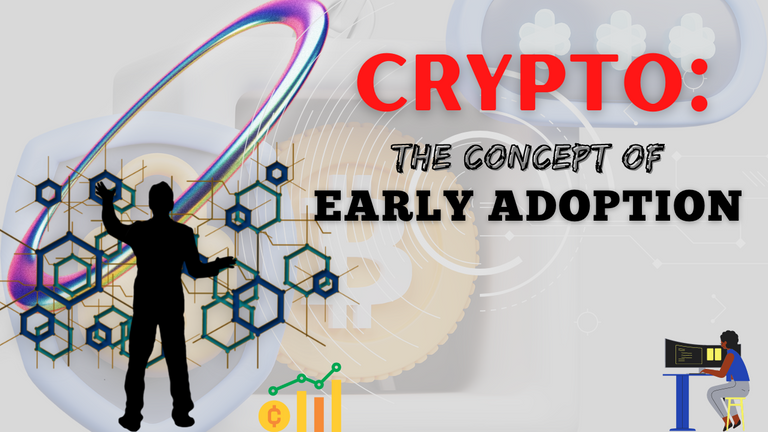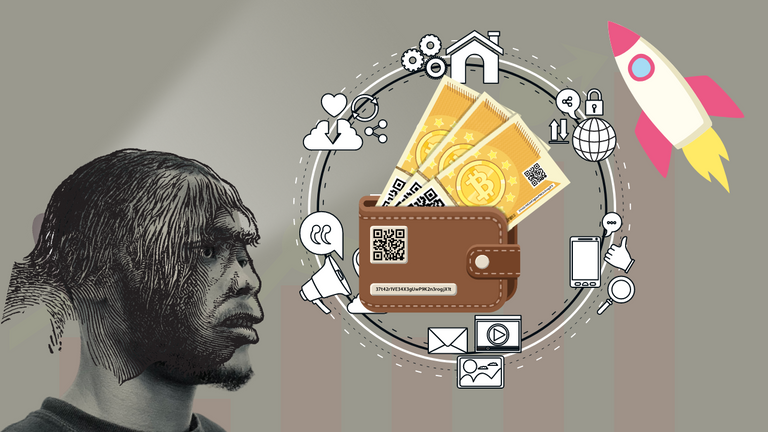
I've seen people who have refused to get into crypto because they have heard stories of how early adopters made big money and it'll be difficult for crypto to replicate all that big money move like it did in the beginning. Let's be realistic, this is a Ponzi mindset.
How?
Firstly ponzis are designed to reward the first takers or the people who are the early originators. This system is meant to convince people on the outside that the system is lucrative. The people on the outside fail to understand that their Money is what's needed to keep the scam running.
It took a while for people to understand that Ponzi is mainly beneficial for the originators or people who got in early and when they did.
everything unconventional became Ponzi, if it's not a 9 to 5 it's Ponzi, if it's about investing in anything digital then it's Ponzi.
However, one of the reasons why adoption is difficult in some African countries is because people do not really know what's crypto, and because of its decentralized nature, there's no ad tailored to spread the word about what it is or get people at the grassroots educated about it. people are used to being spoon-fed by what they watch on TV.
Adoption In African Countries
Some of the financial education that some people have been given to them by the banking sectors, and national financial institutions, and because of their inability to see the flaw in the system, it was difficult for them to see another better system.
So, the lack of thirst and hunger for new financial knowledge is one of the reasons why people in many African countries missed out on the early adoption years of Bitcoin for example. Because most of the people who adopted crypto very early were seekers. They were open to the possibility of taking risks outside the system they were used to and this required a lot of gut and sacrifice. This is one of the problems of early adoption.
People use to wish they were early adopters, but they forget that there were no prerequisites for people who were early adopters, they were just people who made crazy decisions, trusting a system without seeing a precedent of success to motivate and validate their risky moves.
A lot of people in crypto at the moment underestimated that sacrifice.
Because the ability to invest blindly without seeing precedents of profit or success is often called uncalculated risks. Before people can take such risks, it'll mean that they're not 100% motivated by the returns, it could be that 50% of this motivation was driven by the need to find a decentralized money system, while the remaining 50% was the hope that it'll be financially rewarding.

The Context Of Being A Conventional Investor
If it was 100% for the latter, it'll be difficult to be an early adopter because people who are used to conventional means of earning money are driven to make more money with fewer losses, and this is often optimized by the ventures they're vested in. But this isn't crypto. For people back in the days it was make or mar, the sophisticated nature of analyzing crypto using permutations and studying previous movements wasn't completely there.
Because we dislike Uncertainty, we've invented and devised ways to relate with crypto, the early adopters didn't have this luxury. It was more or make it or break it for them, there were no grey areas, it was black or white. But these days people only calculate the money they might have made, forgetting to put into perspective the losses they have incurred in the process.
Technically, crypto is still in its earliest stages
why?
Because crypto is still less than 20 years, people who get in now are more or less early adopters too. Let's take a look at the world at the moment, crypto is facing challenging times, the backlash of negativity from projects such as LUNA is projecting a terrible aura to the whole cryptosphere and a lot of people who are enthusiastic about crypto might associate the disastrous demise of LUNA to be a crypto thing.
Meanwhile, LUNA is just one of the failed projects in a gigantic system made up of other successful projects. This is just like having failed systems in a real-world project
but because it's crypto, it's become a high point for people who are trying to demarket it.
This analogy is meant to explain that crypto hasn't found its way into the most intricate aspects of people's lives, it's getting there, but it hasn't done that completely. So people who are adopting at this period will still have to sift past the negativity surrounding crypto at the moment while believing in the technology to change the future.
My point is, the early adopters back in the day paid their dues, however as time went on, it's generally become easier to adopt crypto, but it's still a bit completely easy. In 50 years, this will be entirely different. However, before then, people who have kept the faith might enjoy massive profits along the line. This means there's always a price to pay. Early adoption doesn't simply amount to easy access to the untold wealth, alone, it's easier to ignore the uncertainty or loss.
The Mental Accounting We're Often Guilty Of
Especially when we begin to do the mental accounting. For example, some people come out to say, if you invested in Bitcoin in 2014, you might own 50 Ferraris and 30 Mansions with just a $10,000 investment. This creates a mental picture of regret for others which to me is a bad thing.
This idea is often flaunted everywhere, but one thing is, in this age of crypto, technically everyone is still an early adopter, however, how many people can cultivate that longevity needed to stay in the game? Get in, and do your best no matter the project. The idea that one cannot Profit because they're not an early adopter is crazy, the mindset alone makes people give up on the future they could be building at the moment.
Interested in some more of my works?
The Intrinsic Propensity To Spend Money
Poverty: The Unwillingness To Spend?
A Scenic Bathroom Photoshoot
The Importance Of Having A Contingency Money Plan
Translational Value; What Is Your Worth?
Using Crypto As A Means Of Transferring Will

Posted Using LeoFinance Beta

